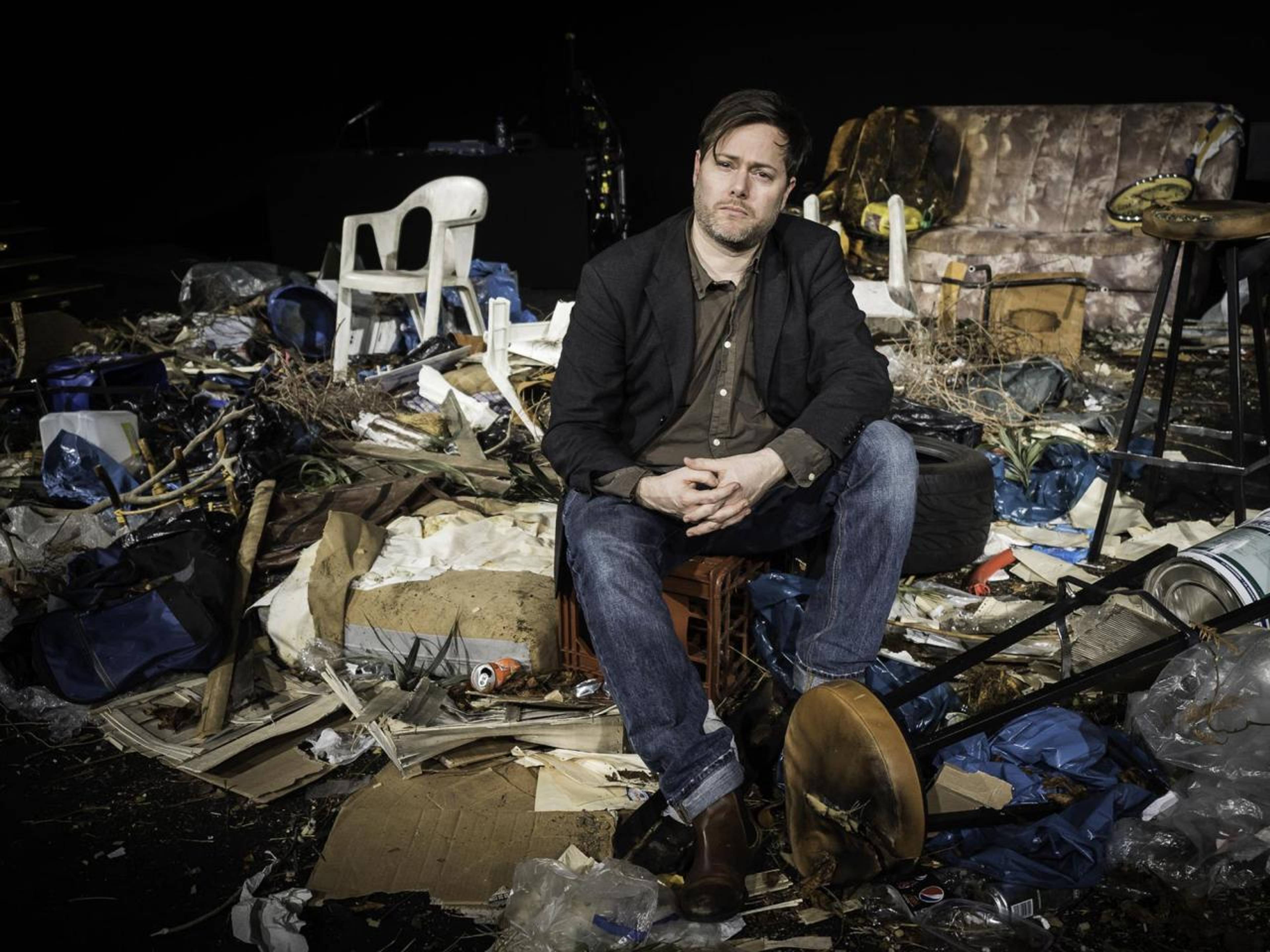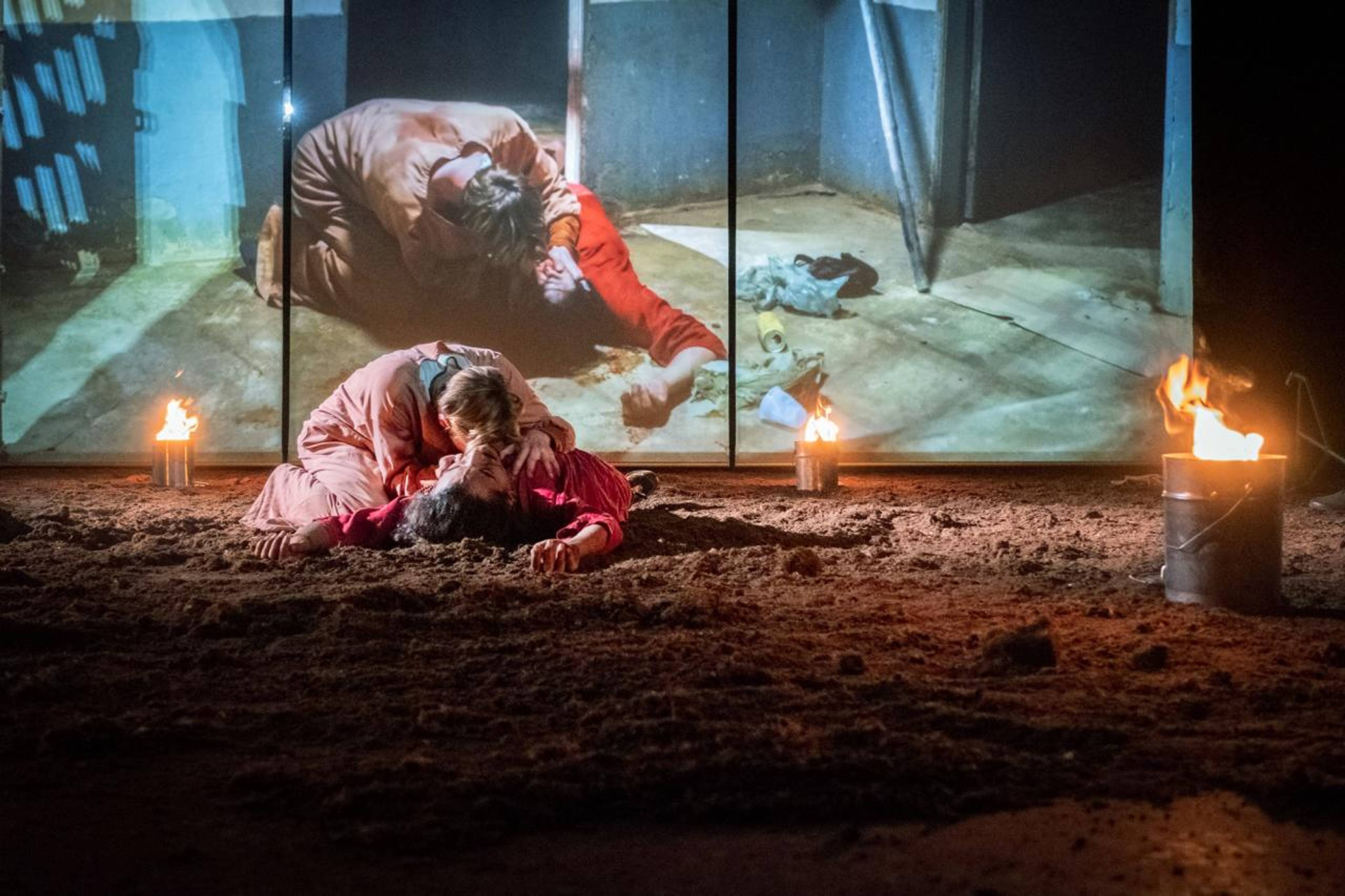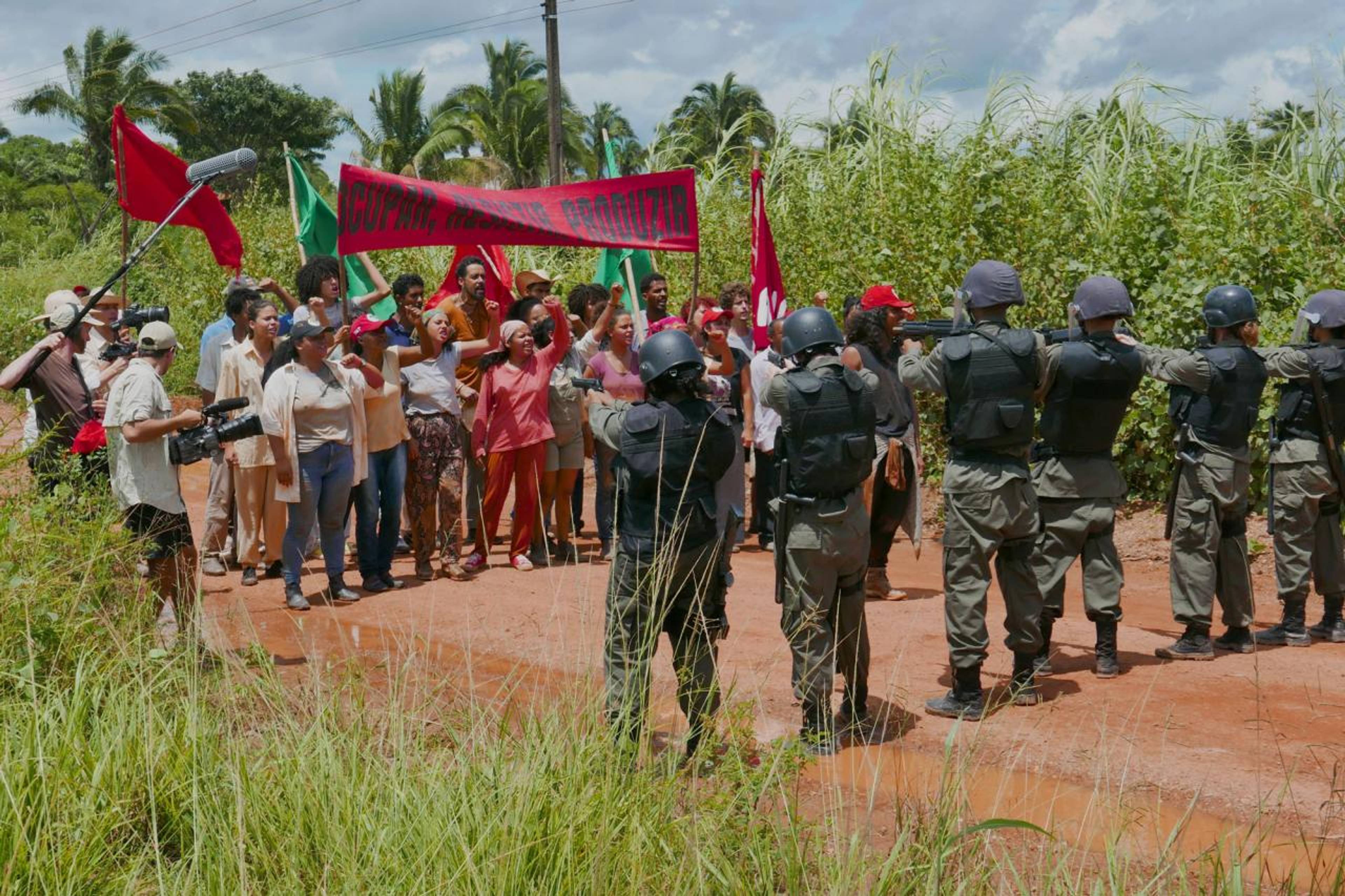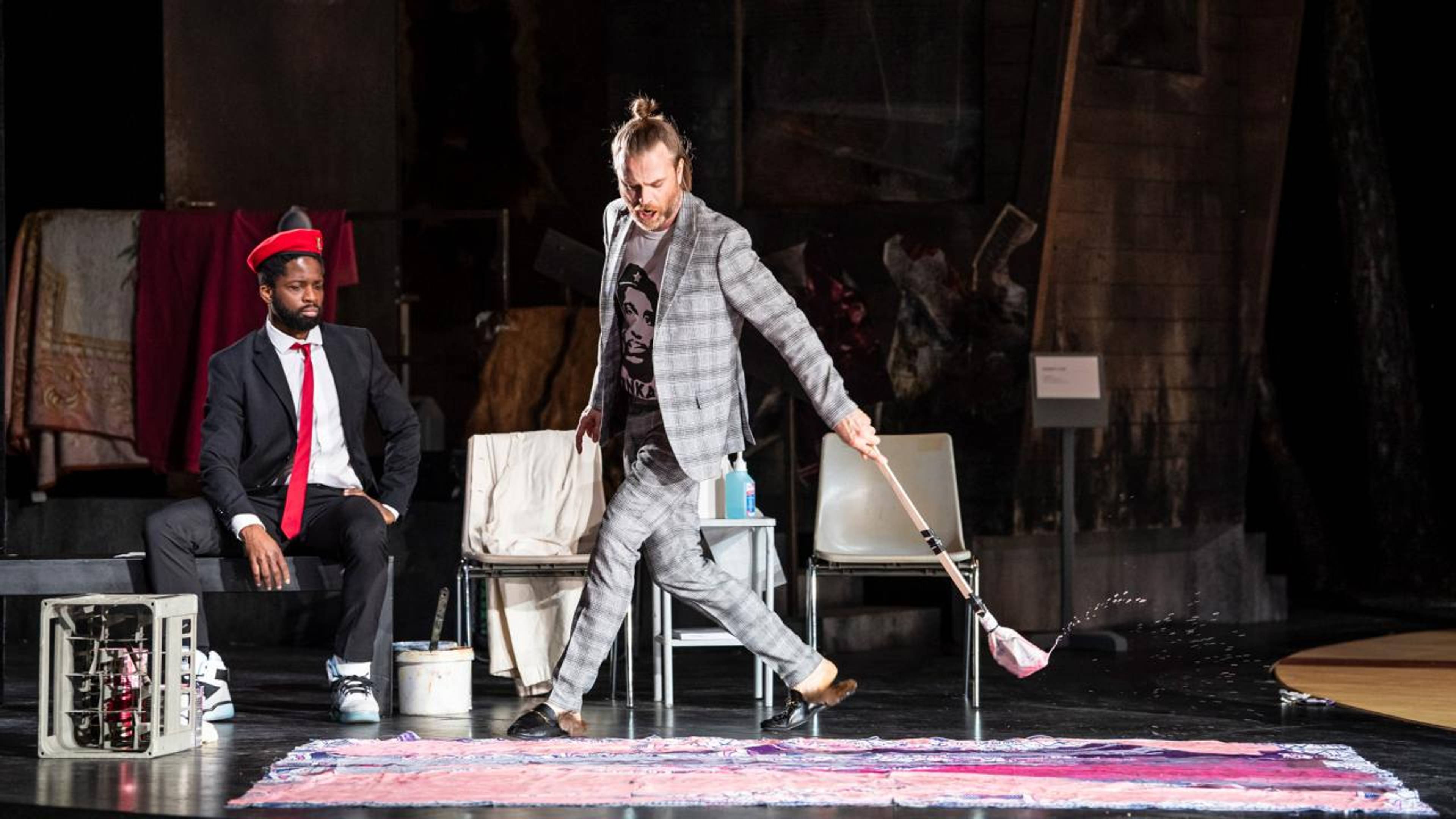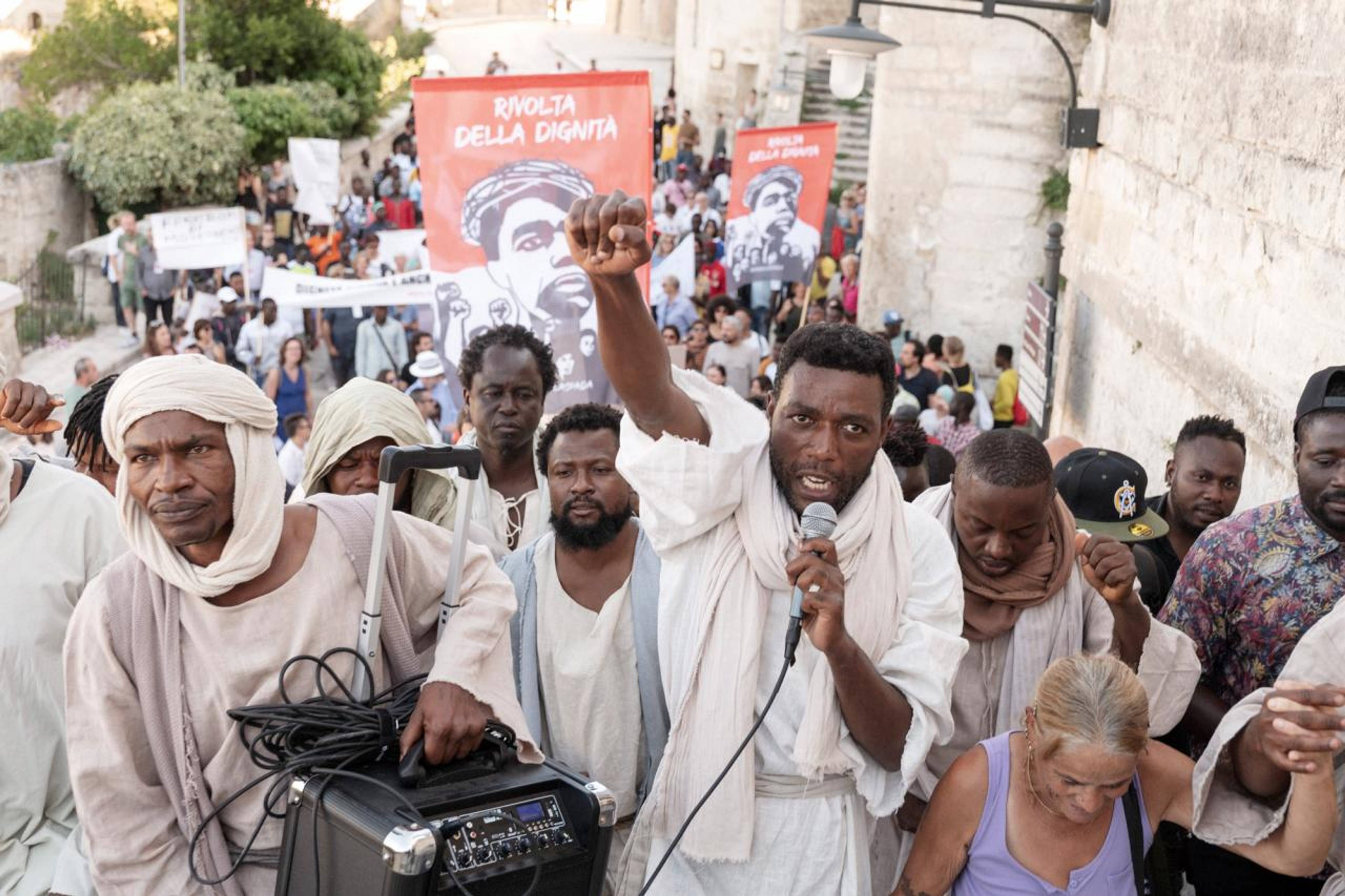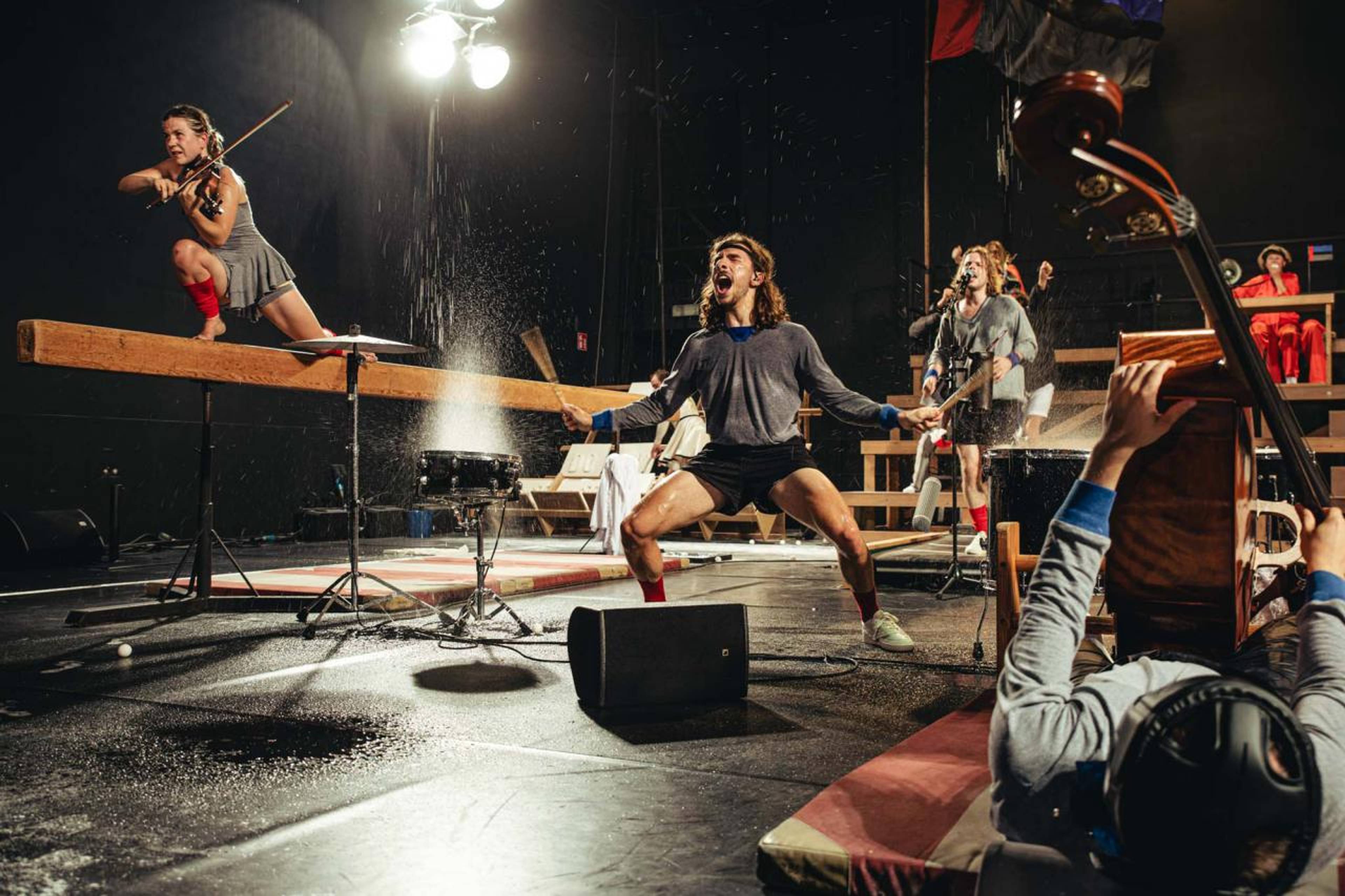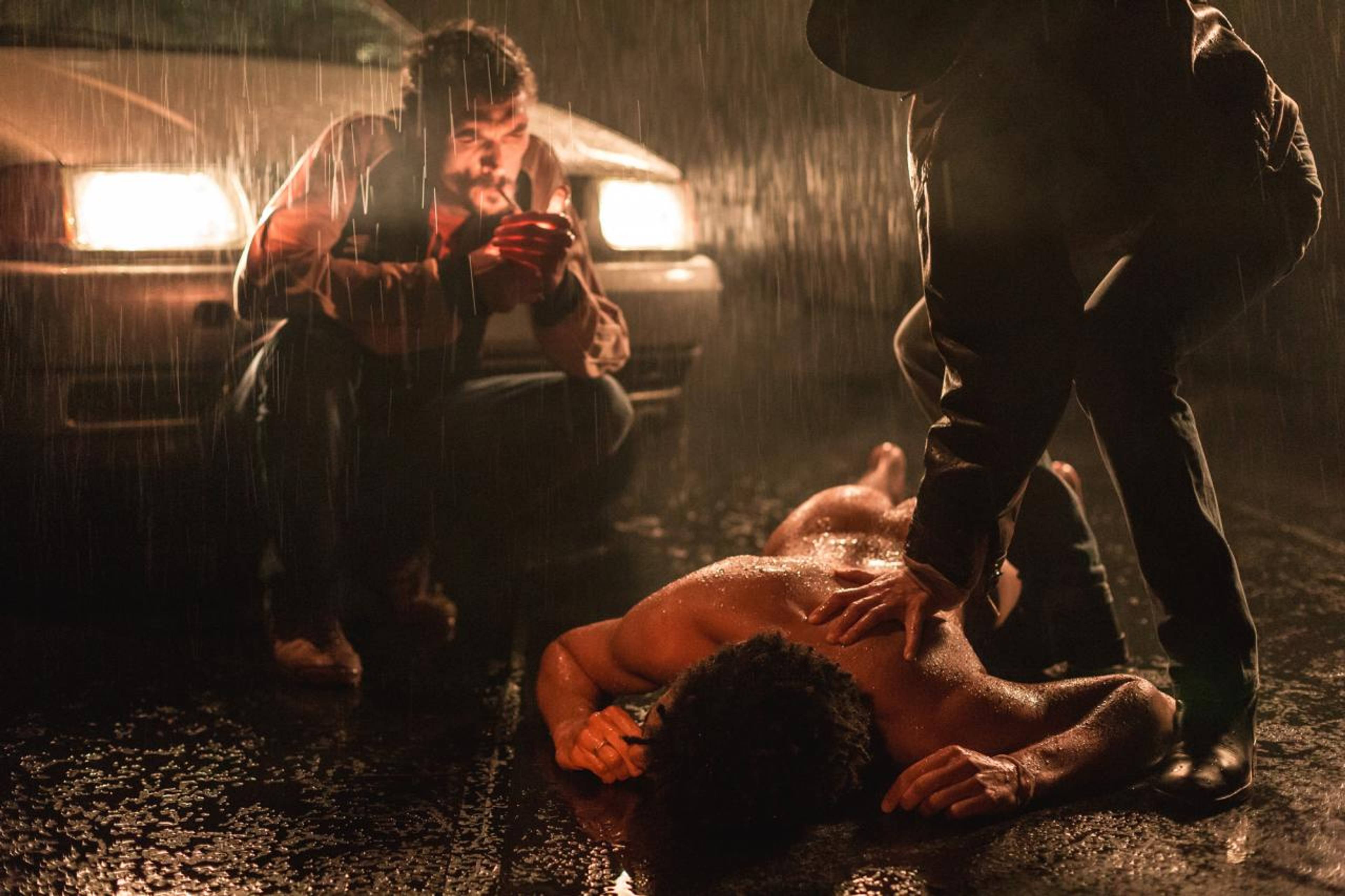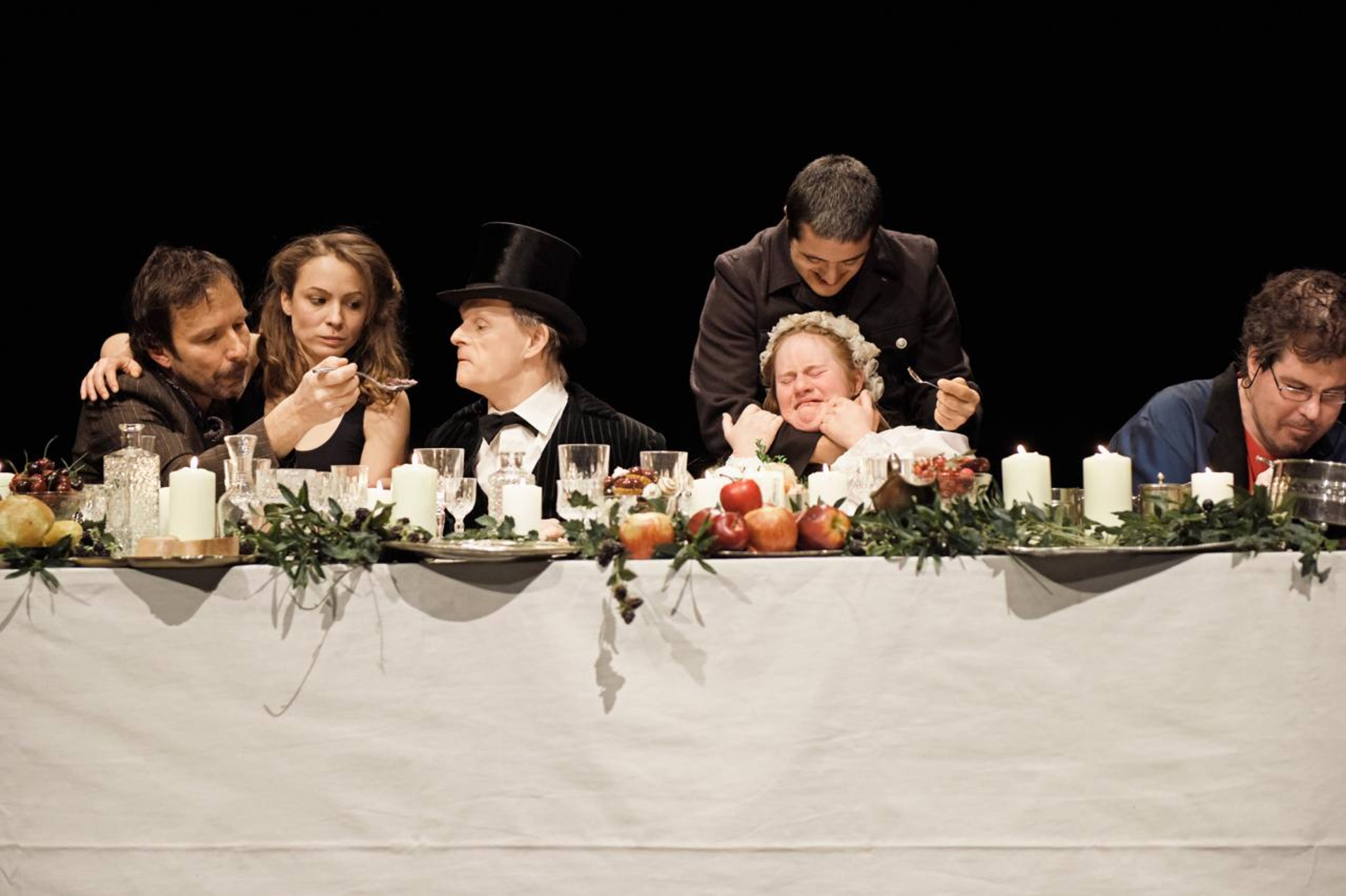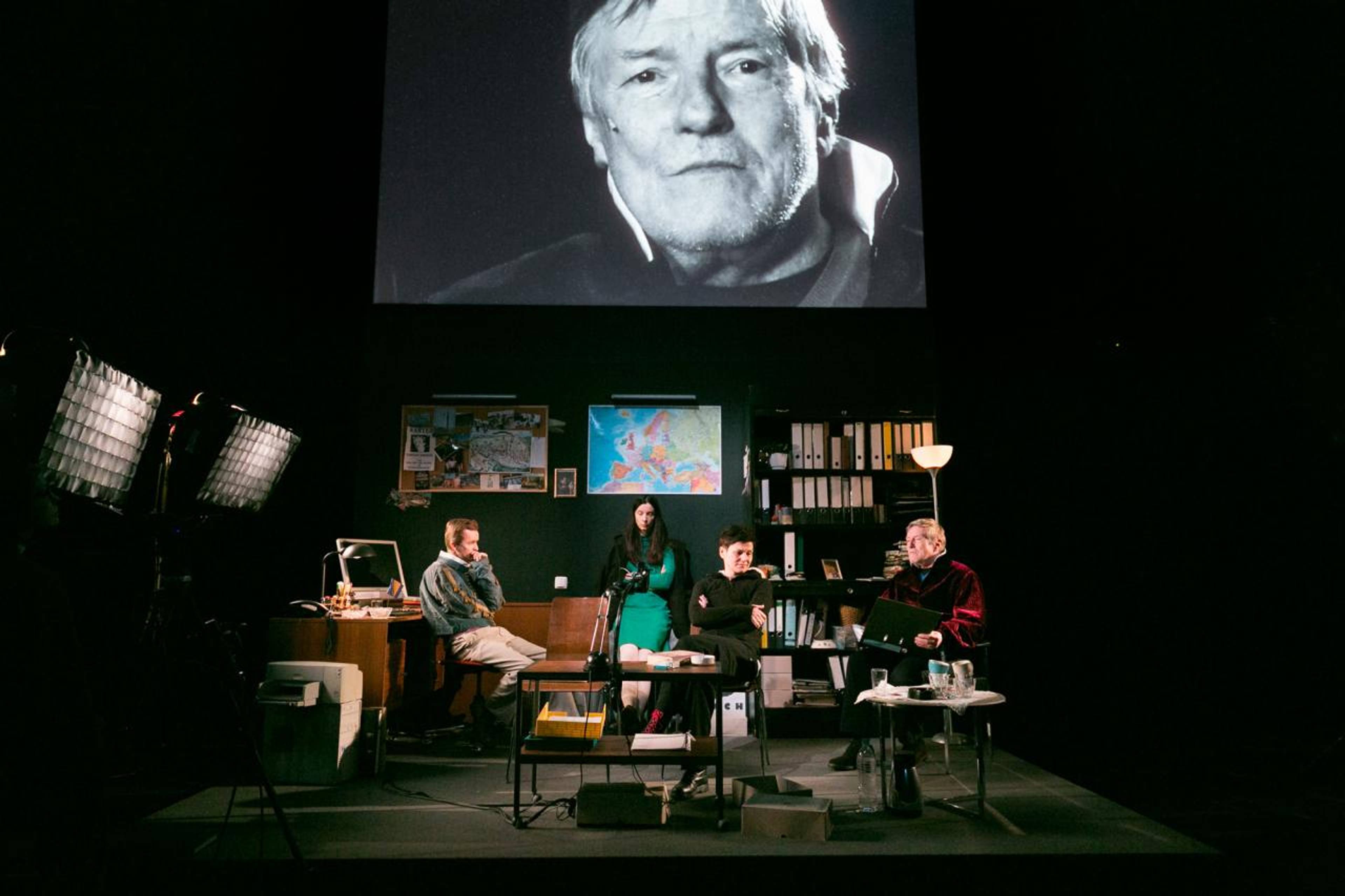Florian Malzacher: You’re a theater and film director, artist, activist, columnist, author... What appeals to you about being an artistic director to boot – first at the theater NTGent and now at the Wiener Festwochen?
Milo Rau: It’s just a different approach. In Ghent, it was simply interesting to say: I’m going to stop with only criticizing institutions – we do that all the time – and instead, I’m going to try to run one. Moreover, I’m going to bring in the things that I lack as an artist, and to implement them in such a way that it becomes the theater, or now the festival, where I myself would like to be. So I am taking more of an experimental approach.
In Ghent, for example, I tried to bring together the respective advantages of the independent scene and the municipal theater. To think at an even more fundamental level: How can you produce differently, tour differently, think of authorship differently, and be more transparent? And then you suddenly get to know the difficulties of institutions from within, their contradictions and their ponderousness. That leads to a certain humility with respect to the possibilities of institutions, which you often overestimate as an independent artist.
Milo Rau, Antigone in the Amazon, 2023. Courtesy: NTGent, Ghent. Photo: Kurt van der Elst
Milo Rau, Antigone in the Amazon, 2023. Courtesy: NTGent, Ghent. Photo: Philipp Lichterbeck
The most important thing is to leave at the right time. When I leave, I will have been artistic director in Ghent for almost seven years, and in Vienna, I have a five-year contract. With projects, it’s absolutely mandatory that they have a fixed end point. But institutions have this property of slowing down time, of creating bonds. Power accrues as a matter of course, no matter how much you try to distribute it. And you have to fight that radically – by leaving. If you first come to such institutions later on in life, as in my case, then maybe it’s easier. I’ve always been good at changing gears and starting again, because that’s the logic of both theater and activism.
We’ve really created a tabula rasa in Ghent and built different production structures – it’s a dream of a theater, open to all, and present all over the world as much as it is in the city itself. The changes that are coming now – for example, that there is a consistent focus on diversity in hiring practices, that the buildings are finally being renovated – I can theoretically do those things, but they’re not my original, innermost talents. So it’s quite natural that someone else will now take those next steps.
I believe one should never stop making the most grotesque and maximalist demands for the good life on stage. Because that’s what it’s there for.
FM: The hassles of implementing and maintaining standards are not your fortes?
MR: What always motivated me in Ghent was the antagonism. I had to realize that the structure rejects me, that the city has a problem, that Flanders either has to get used to it or that there would be conflict. After a few years, everyone came to love me, and I came to love everyone. I got an honorary doctorate, I am a friend of the mayor. That’s when I realized: Now it’s time for me to go.
It also has to be said that running artistic institutions is not rocket science. You’re surrounded by a lot of smart people who also want to change things. Of course, there are the right-wing politicians on NTGent’s Board of Directors, plus the bourgeois critics, whom you can never quite please – and in Vienna, of course, it’s more complicated yet. That has to do with the size, the money, and the traditions of the city and the festival.
Milo Rau, La Clemenza di Tito, 2021. Courtesy: Grand Théâtre de Genève, Geneva. Photo: Carole Parodi
FM: There seems to be a great longing in Vienna for Intendanten who are themselves artists. Is there any truth to this notion? To what extent are you still an artist when you are an artistic director? And what do you see differently from dramaturge-directors, curators, or cultural managers?
MR: I don’t know if such a separation exists, though there are poles, of course. The difference between me and my financial co-director in Ghent is that he really is a leader. He is always trying to mediate, to consolidate, and I’m not a leader in that sense. I always try to build reality according to a collective vision: My leadership model is a permanent revolution. I think that leading institutions means showing why they exist. Of course, that’s also the case in Vienna, where I immediately think: What is a festival, really, and why is there a festival at all – and not, rather, no festival?
I think the classic model of curation – that is, which understands the festival as a vessel for a mixture of products – is outdated. For me, a festival is a collective machine for living, production, and emotion. But maybe I’m more of a sociologist than a theater director.
If you look at what a classical director like Martin Kušej is doing with the Burgtheater, it’s simple: Everything that doesn’t say Shakespeare or Nestroy on it is an academic side program and has to go. He simply wants a lot of screaming on stage, a lot of staging. And that is the danger of the artist-director, that the playbill becomes the playing field of a very one-sided aesthetic. In a city theater or a festival, you need generosity and openness. I learned in Ghent that many productions that are well-received and objectively important are also not the ones I would go to see first. But an ideal artistic institution is total democracy: Not the critics, not the directors, but the city and the audience are always right.
Milo Rau, The New Gospel, 2019. Courtesy: Fruitmarket and Langfilm. Photo: Armin Smailovic (Agentur FOCUS)
FM: You mentioned before that you are attracted by the possibility of making concrete changes as the head of an institution. As an artist, on the other hand, you can make big, radical demands that you don’t necessarily have to implement yourself. In some respects, the artist Milo Rau has to make fewer compromises than the artistic director Milo Rau. This used to be less relevant in political theater some years ago, because one usually wasn’t accused of the discrepancy between the demands onstage and the reality backstage. That has changed – and you also postulate quite clearly that the institution itself must meet the demands made of it. Is it possible to do both at once: to make maximalist demands onstage while undertaking the slow boring of hard boards?
MR: It goes even further than that: The entire life we lead under capitalism is a false, destructive, and, in the end, apocalyptic life. And yet we demand another one. Pablo Casella, the composer of Antigone in the Amazon (2023), has said: “In this generation, we cannot get out of this performative contradiction.” But we still have to demand another world. When the world ends, it will be better if we have at least imagined a better world.
I think it’s important to play out the necessary conflicts within the projects, to expose oneself to the contradictions, but also pragmatically to try to change things. Take Antigone in the Amazon , for example. We will tour that an insane amount, through one hundred cities in two years. The money from the authors’ rights goes directly to the Movimento dos Trabalhadores Rurais Sem Terra (Landless Workers Movement) in Brazil, and they decide what to do with it. That is very concrete. It’s also important to formulate concrete standards against which your own actions can be measured, so that others can also demand them of you.
One of the big problems of our time is that we have a very moralistic, partly paranoid discourse onstage; that we demand a lot, as you said, but that we often don’t know how to break that down and implement it concretely. That’s the reason I decided to do collective institutional work. Nevertheless, I believe one should never stop making the most grotesque and maximalist demands for the good life on stage. Because that's what it’s there for.
We Europeans invented the strong individual in the history of mankind and celebrated it for 3000 years. It’s just difficult now to suddenly say, okay, the whole thing was destructive and psycho and a bit toxic, now it’s over.
FM: In the end, you are still a white man who is at the top of the hierarchy, however flat it may be. And that in a city where, oftentimes, artistic directors have been considered almost monarchs.
MR: The dramaturges and production managers are autonomous. Only when there’s a really big problem does it reach the ears of the artistic directors, because you simply have to take on certain responsibilities – otherwise, it’s not safe for the team. But this grassroots democratic structure is extremely difficult to establish; it took years in Ghent. In Vienna, I am fortunate to be coming into a very self-confident team of smart and incredibly professional people, to which I am now just adding my part. I try to give direction with a vision and some projects that I do myself. But what idea do I have, for example, about music? Or about Austria?
Miet Warlop, ONE SONG: HISTOIRE(S) DU THÉÂTRE IV, 2022. Courtesy: NTGent, Ghent. Photo: Michiel Devijer
FM: Milo Rau may be many, but in the end, it says Milo Rau, who not only earns a higher fee, but also gains symbolic capital. Had you considered applying to Wiener Festwochen as a collective? Or is it important for you, in the end, to have the final decision?
MR: Let me first say something about symbolic capital: I’ve already managed to give NTGent this symbolic power, so that, for example, directors like Miet Warlop suddenly have an international career that they didn’t have before. We produced a play of hers, placed one of them in Avignon [ One Song , 2022], which was covered by the New York Times – and we do that with quite a lot of artists and activists. In Ghent, we use the theater as a machine to bring peripheral positions right into the center; my name and my network help in that respect, of course. The question with symbolic capital is always: What do you invest it in? That is also my plan with the Festwochen: To create a symbolic power for this festival, and to bring peripheral positions onto the big stage.
On the question of the collective application: At this moment in time, that would have had no chance in Vienna – I was advised against it. That said, while my name clearly comes first, it was still an application from a group, that is, together with the dramaturges and so on. For me, the real collective is the whole team, anyway: all the production managers, all the technicians, the hundred people in the Festwochen, and all of our partners. The so-called “collective leadership” as one knows it in some institutions, which always includes two or three friends, is almost more of a hardening, a strengthening of the top against the base, isn’t it?
Milo Rau, Lam Gods, 2018. Photo: Michiel Devijer
FM: The curatorial collective WHW did not have a real chance in Vienna, it seems. [Editor’s note: three members of the all-women, Zagreb-based curatorial collective What, How & for Whom were appointed artistic directors of Vienna’s Kunsthalle Wien in June 2019; the city council announced this past December that their five-year contract would be allowed to expire next summer without extension.]
MR: They simply “failed” because of COVID. We’re doing an exhibition together next spring. They’re anything but failed: In fact, it’s only just getting started with them.
But basically: We Europeans invented the strong individual in the history of mankind and celebrated it over the course of three thousand years. It’s just difficult now to suddenly say, okay, the whole thing was destructive and psycho and a bit toxic, now it’s over. And with Europe, I’m thinking of the whole world that we Europeans colonized. Take Lula in Brazil, for example – he seems irreplaceable.
Vienna asks: Into what hopeless mess may we plunge tomorrow? THAT will offer me the vital counterpoint I need.
FM: What are the functions of an international festival today? Such large-scale events are heavily criticized – and for many good reasons, from the attitude of simply shopping internationally for productions, kerosene consumption, and a lack of sustainability, to questions about the colonial, exoticizing view of art and their outdated universalism. How do you deal with this?
MR: In Ghent, we tried to maintain a balance between internationality and localism, between invitations and our own productions. We also invited groups that are absolutely essential locally but unknown abroad, as well as works that we felt were important to show in Ghent. It’s a question of balance.
In Vienna, the size of the city alone means that it’s full of crazy characters, artists, and activists. Vienna is simply an incredibly interesting city. And then there’s its proximity to Eastern Europe! For the last twenty years, I have concentrated on the Global South, which, owing to colonialism, is an inescapable given in Belgium. Now, in Vienna, I suddenly have the feeling that I’ve been looking at the world too one-sidedly.
Vienna is the second-largest German-speaking city in the world, the fourth-largest city in Europe, and such a juggernaut and painstaking apparatus of tradition, while at the same time having this legacy of modernity. I ask myself: What kind of city is this? Because I always work very directly from context. Then there’s the city’s Jewish past, but also its anti-Semitic past, its imperial past, the inward and outward flows of migration, and the fact that half the population immigrated from Eastern and Southeastern Europe. I’m totally up for investigating all of these things.
Milo Rau, 120 Days of Sodom, 2017. Courtesy: Schauspielhaus Zürich. Photo: Toni Suter
FM: Since you’re talking about Viennese traditions: There’s also a strange love-hate relationship here with provocation, which you certainly have a reputation for delivering. Isn’t that bringing owls to Athens?
MR: Some cities actually seem better suited for provocations than others. If you look at Christoph Schlingensief in Zurich with the former neo-Nazis performing Hamlet and in Vienna with the deportation container for asylum-seekers, then you have to say: That didn’t work in Zurich. Vienna is a reactive space, and the artists and the audience are geared to the extreme, from Viennese Actionism to Elfriede Jelinek and Florentina Holzinger. A normal city would say: We’ve had modernism, psychoanalysis, twelve-tone music, anti-Semitism, the Habsburg monarchy, Jörg Haider, and Florian Teichtmeister – but that’s enough now. But Vienna asks: Into what hopeless mess may we plunge tomorrow? That will offer me the vital counterpoint I need.
FM: Especially since the political situation is just getting worse.
MR: Austria has decided to dive deep into fascism once again – it’s happening right now in some states, and it will happen at the federal level next year, probably. Then, Austria will again become the laboratory of right-wing populism, which is even more aggressive, which minces words even less than it did in 2000, when Schlingensief came with the containers. I have lived for a long time in Western Europe, which still indulges in certain illusions. But Austria is Central Europe, and Central Europe has done away with all illusions. There is a saying: If the world should end someday, I’ll go to Vienna, where I will still have another fifty years. But in terms of the decay of Western democracy, Austria is always at least ten years further ahead of everyone else toward the end of the world.
Milo Rau, The Dark Ages, 2015. Courtesy: Residenztheater, Munich. Photo: Thomas Dashuber
___


